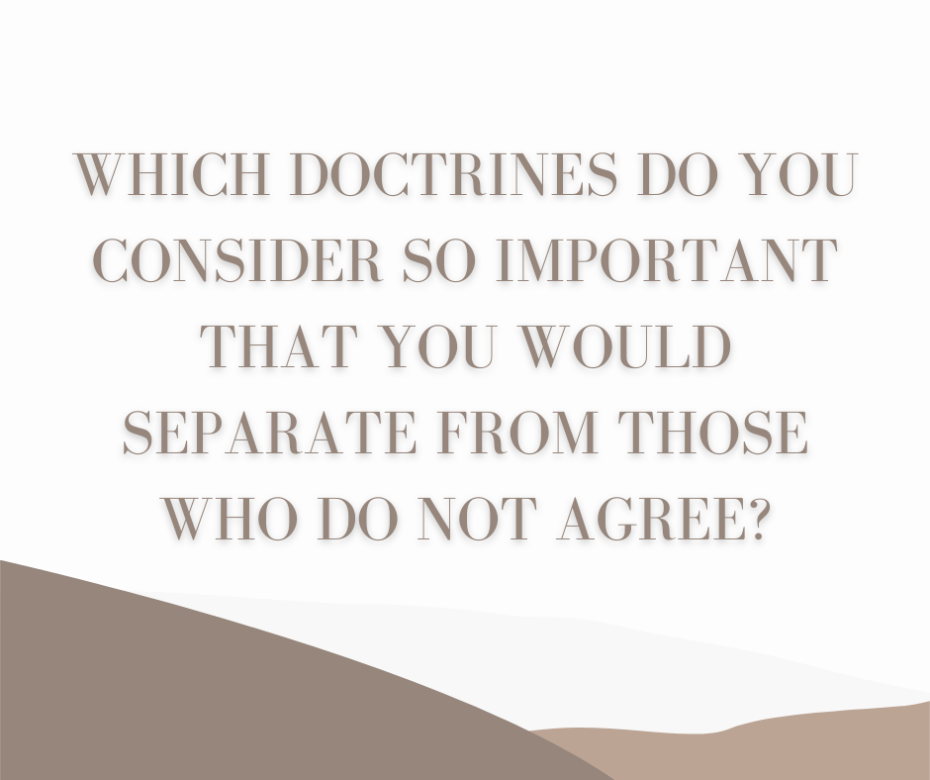The other day I read a book review in the Journal of the Evangelical Theological Society (JETS, June 2021, pp. 411-415). The book reviewed was Finding the Right Hills to Die On: The Case for Theological Triage by Gavin Ortlund. I’ve not read the book yet. But the review pointed out a fascinating way at looking at the importance of various theological doctrines.
According to Eric Oldenburg, the reviewer, Ortlund suggests “a four-fold division between, successively, first-rank or essential doctrines, second-rank or urgent doctrines, third-rank or important doctrines, and fourth-rank or unimportant doctrines” (p. 411). Ortlund calls the virgin birth and justification by faith first-rank doctrines. Second-rank doctrines are listed as cessationism versus continuationism and the complementarian-egalitarian debate. He lists the doctrines of the Millennium and the creation-evolution debate as third rank. The reviewer does not indicate what Ortlund gave as examples of fourth-rank doctrines.
I wondered: how would I rank the four levels of doctrine concerning Free Grace Theology? As you may imagine, I have an opinion on that!
First-level, that is, essential Free Grace doctrines include saving faith as persuasion, assurance as of the essence of saving faith, eternal security, justification by faith alone, the virgin birth, the deity of Christ, the Trinity, substitutionary atonement, unlimited atonement, Jesus’ bodily resurrection from the dead on the third day, and Jesus’ soon return.i
I suggest the following doctrines as second-level Free Grace doctrines, urgent but not essential: the inerrancy of Scripture, the difference between eternal salvation and eternal rewards, baptism by immersion as the first step in discipleship, and verse-by-verse Bible exposition.
Third-level, that is, important Free Grace doctrines include young earth creationism (YEC), worldwide flood, eternal conscious torment (ECT), the dangers of contemplative spirituality, cessationism versus continuationism, elder rule, the Lord’s Supper, and dispensationalism.
Fourth-level, that is, unimportant Free Grace doctrines, are any doctrines that do not demonstrably impact the Free Grace position. I’d call the following fourth-level Free Grace doctrines: head coverings for women when they pray, circumcision for health reasons, dietary practices for health reasons, drinking wine versus being a teetotaler, tattoos, and preferred Bible translation.
Here is how this is practical.
We should understand that there are people who identify as Free Grace who have different essential Free Grace doctrines from what I’ve outlined. GES has been rebuked by people who call themselves Free Grace because of our belief that assurance is of the essence of saving faith. If someone who identifies as Free Grace believes that Roman Catholics and other works salvation folks are born again and eternally secure even if they have never believed in the free gift of everlasting life, then it should be understood that they are misaligned with GES, and we with them. The two doctrinal positions differ as to what one must do to have everlasting life, and that places us on different paths, even though each identifies as Free Grace.
I do not think that second-, third-, or fourth-level Free Grace doctrines are so vital that we should separate over them. I know many within GES, for example, who do not believe in YEC, cessationism, or elder rule.
Some of the doctrines I listed as second- or third-level Free Grace doctrines are very close to a cause of separation for me: the rejection of ECT, the rejection of inerrancy, and the embrace of contemplative spirituality. Of course, it is my experience that when people disagree on those issues, they also disagree on one or more of the level-one Free Grace doctrines.
What about you? How would you define the first, second, third, and fourth levels of Free Grace Theology? Which doctrines are so important that you would separate from those who do not agree?
The key to doctrine is to have “the mind of Christ” (1 Cor 2:16). If we believe and teach what He taught, then we will be on solid footing when He judges us at the Bema.
__________
i I’m not suggesting that a person cannot be born again without believing all these doctrines. The sole condition of the new birth is to believe in the Lord Jesus Christ for the gift of God, everlasting life (John 3:16; 4:10, 14; 5:24; 6:25-27). But if someone does not believe all these doctrines, then he is not Free Grace.


